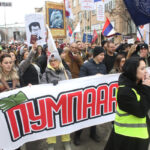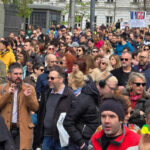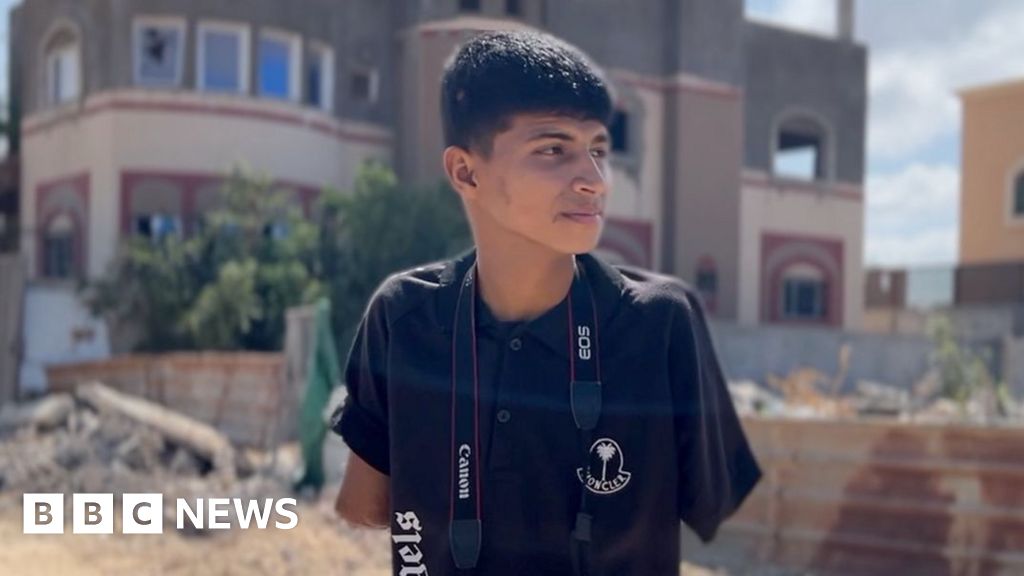Rizeq Tafish, who is standing between two bars at a mobile medical clinic in Rafah in southern Gaza, concentrates on his first tentative steps after four months.
“My feelings were despair and sadness before. “Now I feel freedom and happiness,” he says, smiling afterwards.
Rizeq was one of the first thousands of Palestinians to receive new prosthetic limbs, using the latest British technology, from Jordanian doctors.
Warning: This report contains graphic images of injuries
He was injured by Israeli tank fire in June as he left the Friday prayers. The blacksmith was desperate because he could no longer work after his leg was amputated.
Rizeq: “I lost everything, my job and my hopes.” “There was nobody to care for my wife and child.” I needed help using the toilet.
The human cost of Israel’s destructive, year-long war on Gaza is not only measured in the lives lost, but also in the lives forever changed.
The UN‘s World Health Organization estimates that 94,000 people have been injured after analysing emergency medical data. One in 100 Gazans, or more than 24,000 people, has suffered a life-changing accident. This includes serious burns, head and spinal trauma and limb amputations.
Only 16 of the 36 hospitals in Gaza are functioning. Rehabilitation services are severely disrupted. According to the WHO, only 12% of the equipment required for injured people (such as wheelchairs and crutches) is available.
The Jordanian program uses innovative prosthetics by two British companies, Koalaa & Amparo. They have sockets that are easy to fit and a direct moulding technique, which is used for lower limbs. This eliminates the need for multiple fittings and months of waiting.
“This is a brand new type of prosthesis. Its main feature, however, is its rapid manufacture. It will be ready in one to two hours for the patient,” explains Jordanian Army doctor Lt Abdullah Hamada who has fitted Rizeq’s replacement leg.
His medical team has helped dozens amputees. Each prosthetic limb is about $1,400 (PS1,100), funded by the Jordanian government and a national charity.
Each fitting is digitally registered, allowing remote monitoring and follow up procedures.
Two Jordanian mobile units will be deployed if it is deemed safe. Gaza has a great need for prosthetics among all age groups.
Sisters Hanan and Misk al-Doubri, who live in central Gaza’s al-Aqsa Martyrs Hospital, are so small they can fit into one wheelchair. Last month, an Israeli airstrike on their home in Deir al-Balah caused their mother to die and their legs to be amputated.
Misk, a 18-month-old baby, had only just started to walk. She struggles to stand on one foot. Hanan, a three-year-old girl, suffered much more serious injuries. She was thrown out of the first floor apartment where her family lived.
Sheifa, her aunt, says: “We try and distract her, but every time she asks about her mother, she returns to it.” “She asks ‘Where are your legs?’ and I don’t have any idea what to say.”
I asked the Israeli military to explain why the al-Doubris was targeted, but got no response.
Locals believe that the father of the girls, a policeman who is still in intensive care, was targeted. Israel has targeted many people who work for the security forces of Hamas-ruled Gaza.
Diya al-Adini, 15, surveys the destruction near his home in Deir al-Balah while Israeli drones hover overhead. He always wears a digital camera, his prized possession that he bought with his months-long savings.
He can’t use it without help: he doesn’t have arms.
Diya was playing computer games in a coffeeshop when Israel bombed the place.
“The rocket’s speed made it difficult for me to react.” Diya says that after it hit, she lost consciousness for several seconds. “When I woke up, everything was white. It was like I was watching a film. I tried to get out of bed, but I was unable to move at all. I had no hands to help me.”
Diya loved to swim and walk his dogs. He did errands by bicycle and took landscape photos. Aya, his older sister, takes photos for him now. But he is determined not to give up.
“I’m trying to plan for a bright future so that, after I get prosthetics I can work hard to excel and become a famous photograher,” he says. “I need my limbs so I can return to my photography and everything I love.”
Rizeq Tafish, who now lives in a tent camp, was given crutches by his doctors to help him adjust his new prosthetic leg.
“I want forget the time when I was without legs and start over.” “I still consider myself whole and complete,” says the journalist, who works for the BBC in Gaza.
“I could return to my old job or find a new one now that I’ve got my new limb.” “Just getting my leg back also gives me my smile that i want to share with everyone.”
When he finally reaches his family, there are tears of happiness and smiles. Rizeq’s wife and mother are overcome with joy as he embraces her without any assistance.
Rizeq, like many others in Gaza, is learning to live with a new disability. But he’s taken the first step toward regaining his life.
Read More @ www.bbc.com













